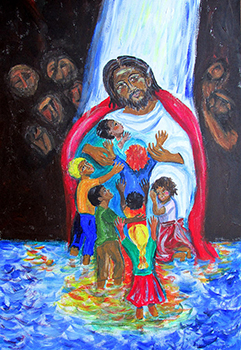Suffer the Children
Published: 15 September 2024
From Our Archives
Debie Thomas, Who Is the Greatest? (2021); Debie Thomas, Welcome the Child (2018).
This Week's Essay
Mark 9:36, "He took the child in his arms."
For Sunday September 22, 2024
Lectionary Readings (Revised Common Lectionary, Year B)
Psalm 1 or Psalm 54
James 3:13–4:3, 7–8
Mark 9:30–37
I think it's fair to say that our contemporary culture is obsessed with greatness. Consider the endless iterations of the GOAT meme. Who is the "greatest of all time" artist, athlete, musician, or president? There's even a television reality show called The Goat, in which "reality stars" from other reality shows compete for the title of the greatest reality show contestant of all time. You can't make this up, right?
I recently read the new book Emperor of Rome (2023) by the Cambridge classicist Mary Beard, and was reminded how the ancients were likewise obsessed with greatness. The emperors projected and embodied the greatness of the sprawling empire of 50 million people from Scotland to the Sahara, from Portugal to Iraq. Consider, for example, Augustus (63 BCE to 14 CE)—the founder of the Roman Empire, who ruled during the time of Jesus, and who is mentioned in Luke 2:1.
When he was thirty-five, over forty years before he died, Augustus built an enormous mausoleum in the center of Rome. In 2021, it was reopened to the public after a comprehensive restoration. At 295 feet in diameter and 137 feet high, and occupying the equivalent of several city blocks, the largest circular tomb in the world is what Beard calls "an uncompromising symbol of autocratic power." It's an architectural prequel that was meant to pre-empt memory.
Augustus then wrote an encomium about himself called What I Did, which upon his death was engraved onto two bronze pillars at the entrance to his tomb. Copies of this "relentlessly egocentric first-person narrative" were distributed throughout the empire. They complimented the tens of thousands of statues and portraits, and millions of coins, that bore the image of Gaius Octavius—caesar Augustus (the exalted), pontifex maximus (chief priest), princeps (first citizen), imperator (commander in chief), pater patria (father of his country), and divi filius (son of a god).
And then we have the subversive story of Jesus in this week's gospel. He says that the holy grail of human greatness that we honor, envy and pursue—things like rank, wealth, fame, power, title, privilege, and prestige, are a dangerous diversion. They have but a limited capacity to nourish personal fulfillment. Seeking greatness, especially if you attain it, can prevent us from experiencing the fullness of God's kingdom.
 |
|
Jesus Loves the Children by Sarah Hornsby.
|
To make his point, by his words and actions, Jesus radically reversed our normal ideas about greatness. He said that little children epitomize life in God's kingdom.
Three different times in Mark's gospel, Jesus warned his disciples about the tragic end that awaited him in Jerusalem. And all three times they responded with objections, disbelief, fear, and ignorance.
After his first "passion prediction," Peter rebuked Jesus: "Lord, this shall never happen to you!" But Jesus rebuked Peter for trying to prevent his sufferings: "You do not have in mind the things of God but the things of man." The way of God for Jesus was not power or greatness but suffering and sacrifice.
After another prediction, James and John made a grab at greatness. They asked Jesus for positions of glory. The ten other disciples were indignant, clearly worried that James and John might gain some advantage over them. There's nothing quite like your own insecurity about greatness to reveal your envy when someone else attains it.
And then in this week's gospel, after a third passion prediction, the disciples argued among themselves about who was the greatest. There's a bitter irony in this story, because in the previous paragraph they were unable to heal a little boy, and what's so great about that?
Jesus responded to his disciples in two ways. First, he gave them a teaching: "Calling the Twelve to himself, Jesus said, 'If anyone wants to be first, he must be the very last, and the servant of all.'"
Second, Jesus dramatized his teaching with some street theater. He placed a little child before the disciples. He then embraced the child and said, "Whoever welcomes one of these children in my name welcomes me; and whoever welcomes me does not welcome me but the one who sent me."
The parallel account of the same passage in Matthew 18 makes an important editorial change. In Matthew's version, Jesus says, "unless you change and become like little children, you will never enter the kingdom of heaven."
Having received this subversive teaching, just one page later in Mark's gospel the disciples rebuked people who brought little children to Jesus so that he would bless them. "When Jesus saw this, he was indignant. He said to them, 'Let the little children come to me, and do not hinder them, for the kingdom of God belongs to such as these. I tell you the truth, anyone who will not receive the kingdom of God like a little child will never enter it.'" As I wrote a few weeks ago in my essay Angry Jesus, this was one of the very few times in the gospels when Jesus got angry—when his closest disciples were dismissive of children.
 |
|
Children Coming To Jesus by Gloria Ssali.
|
To welcome a child is to extend the simplest of acts to an individual whom society dismisses as perhaps cute but ultimately insignificant, someone who lacks any accomplishments, greatness, status, or pretensions. Children need and expect our love and protection.
Jesus invites us to welcome every person in the same manner, without regard for their greatness. To welcome another person in that way, Jesus says, is to welcome him, and in turn to welcome God the Father who sent him.
Similarly, to become or imitate children is to see our own selves in the same way. Instead of searching for significance in titles, honors, or professional successes, we simply enjoy the knowledge that we are ordinary people loved by an extraordinary God. The greatest honor that we can give Almighty God, said Juliana of Norwich, is to live gladly because of the knowledge of his love, like little children with loving parents.
So, in welcoming and in imitating children, we receive or enter the kingdom, like we ourselves are beloved children.
I wonder if Jesus knew of the Roman emperors Augustus (Luke 2:1) or his successor Tiberius (Luke 3:1). Beard says that the average Roman might not have been able to name their emperor, but they definitely would have known of the "terror of his power without limits." In her chapter called "Power Dining" about state dinners with the emperor, she draws a sharp contrast between the elite guests and the enslaved servants.
Imperial dinners were spectacles of political power that were designed to glorify the emperor. They could include sadistic cruelty—recall how Herod beheaded John the Baptist on a dinner party dare. They were a glaring example of what Beard calls "the division of humankind into those who served and those who were served."
 |
|
Suffer the Children by Janice Nabors Raiteri.
|
The menial underlings who produced the lavish feasts included cooks, cleaners, butlers, dish washers, waiters, tasters, caterers, sommeliers, people in charge of invitations and table napkins, and then the after dinner entertainment provided by the musicians, readers, "jokers," and pranksters who were called "the little shits." These would have included disabled people, says Beard, like the deaf and the blind, and in one story about the emperor Commodus, "two twisted hunchbacks smeared with mustard on a large silver dish." It took many thousands of slaves to make imperial life possible.
It is precisely this sort of strict, cruel, and abusive social hierarchy, whether ancient or modern, that Jesus subverts in this week's gospel about greatness. "If anyone wants to be first, he must be the very last, and the servant of all. Whoever welcomes a little child in my name welcomes me; and whoever welcomes me does not welcome me but the one who sent me. I tell you the truth, unless you change and become like little children, you will never enter the kingdom of God. Whoever humbles himself like a little child is the greatest in the kingdom of heaven."
Weekly Prayer
The Covenant Prayer of John Wesley (1703–1791)
I am no longer my own, but thine.
Put me to what thou wilt, rank me with whom thou wilt.
Put me to doing, put me to suffering.
Let me be employed for thee or laid aside for thee,
exalted for thee or brought low for thee.
Let me be full, let me be empty.
Let me have all things, let me have nothing.
I freely and heartily yield all things to thy pleasure and disposal.
And now, O glorious and blessed God, Father, Son and Holy Spirit,
thou art mine, and I am thine.
So be it.
And the covenant which I have made on earth,
let it be ratified in heaven.
Amen.From Adam Hamilton, Seeing Gray in a World of Black and White (Nashville: Abingdon, 2008), page 232. In his footnote to this prayer Hamilton directs readers to The United Methodist Hymnal (Nashville: The United Methodist Publishing House, 1989), p. 607.
Dan Clendenin: dan@journeywithjesus.net
Image credits: (1) Fine Art America; (2) Fine Art America; and (3) Fine Art America.



